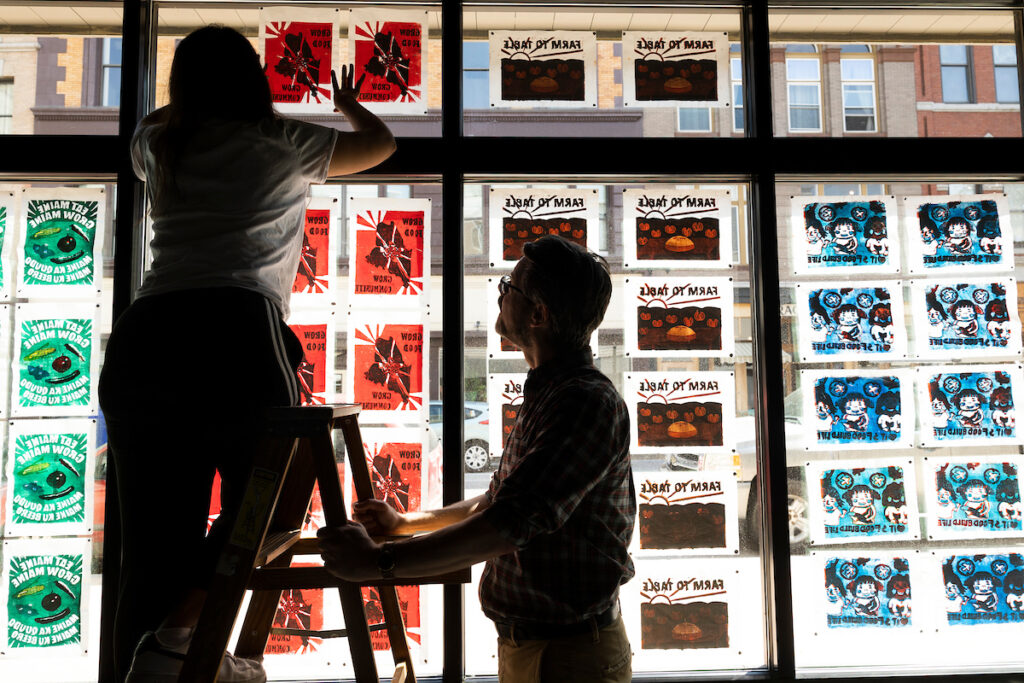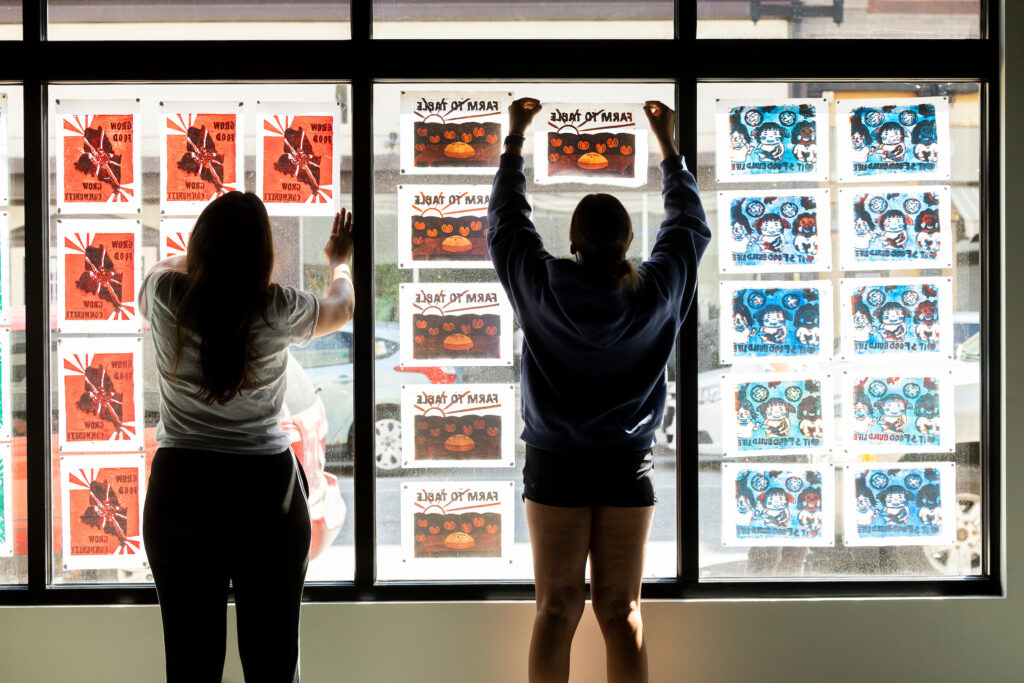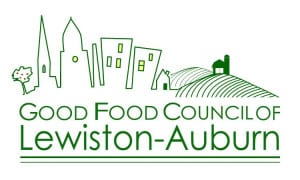
Bates Short Term “Art and Social Practice” class installs artwork inspired by the community-driven goals of the Local Foods Action Plan for Lewiston-Auburn in the windows of the Hartley Block at 155 Lisbon St, Lewiston. The installation is on view through June 10. Credit: Phyllis Graber Jensen/Bates College
LEWISTON/AUBURN — A large street-level collage of student art posters in the windows of the Hartley Block at 155 Lisbon St in Lewiston that was inspired by the goals of a community-driven Local Foods Action Plan for Lewiston-Auburn can be seen during this weekend’s Art Walk LA and through June 10.
The Local Foods Local Places (LFLP) Action Plan for Lewiston-Auburn serves both as a record of a community planning process and a road map for Lewiston-Auburn as it grows and strengthens the local food system and economy. This October, there will be a large public event to create a 2.0 Action Plan with new priority actions to advance the local food system and economy for the next 3-5 years.
During Bates College’s month-long Short Term, students in Prof. Michel Droge’s “Art and Social Practice” class combined research of historical and contemporary social practice with practical studio experience and collaborative community engagement, paying special attention to issues of equity, inclusion, and accessibility. Partnering with the Coordinating Team of the LFLP Action Plan which includes the Good Food Council of Lewiston-Auburn (GFCLA) and the St. Mary’s Nutrition Center (NC), students examined local solutions to food and land justice issues and investigated how socially-engaged art can raise awareness and motivate action around such causes.

Bates Short Term “Art and Social Practice” class installs artwork inspired by the community-driven goals of the Local Foods Action Plan for Lewiston-Auburn in the windows of the Hartley Block at 155 Lisbon St, Lewiston. The installation is on view through June 10. Credit: Phyllis Graber Jensen/Bates College
After studying socially-engaged art through a historical lens, looking at political posters, woodblock prints, murals, and other art forms, students were visited by representatives of the GFCLA and the NC who shared the community-driven goals of the LFLP Action Plan. Based on these goals, the students created work that aimed to utilize art-making as a form of collaborative activism and support.
Students gained firsthand knowledge and on-the-ground experience of the local food scene by volunteering with both the Lewiston Farmers’ Market to help with their annual Spaghetti Squash Dinner, and by spending an afternoon planting onions and beets at the New Roots Cooperative Farm in Lewiston.
Each student designed a reduction relief print and produced dozens of copies of their print, which they installed in the windows of the Hartley Block on Lisbon Street in downtown Lewiston. Together, the posters constitute a giant poster window collage on view through June 10.
The partnership between Prof. Droge’s class, LFLP, the Lewiston Farmers’ Market, and New Roots Cooperative Farm was facilitated by the Harward Center for Community Partnerships at Bates College.
Members of the public are invited to visit this link to learn more about the LFLP Action Plan and to join the email list to receive updates including information about the October event to create a 2.0 Local Foods Action Plan when details become available. More information about Artwalk LA can be found at laarts.org/artwalk.
##
The Local Foods Local Places (LFLP) Action Plan serves both as a record of a community planning process and a road map for Lewiston-Auburn as it grows and strengthens the local food system and economy. It captures the local food vision of the approximately 80+ attendees to the LFLP events on October 22 and 23, 2019 and crystallizes it into sixteen action steps that — along with numerous individual, business, organizational, and municipal commitments — aim to fulfill the following four goals:
1. Strengthen Access To Local Food While Expanding Market Opportunities and Infrastructure for Farm and Food Businesses;
2. Integrate Local Food and Agriculture into City Planning and Economic Development Strategies;
3. Build Food and Agriculture as a Defining Brand for Lewiston-Auburn; and
4. Increase equitable access, ownership, and preservation of land to grow food in Lewiston-Auburn.
LFLP Action Lead Partners have included The LA Metro Chamber of Commerce, The Cities of Auburn and Lewiston, Somali-Bantu Community Association, Land In Common, and the Cooperative Development Institute, among others.
The Good Food Council of Lewiston-Auburn (GFCLA) was formed in 2012 to create and support improvements to the food system, from farm-to-fork, within the greater Lewiston-Auburn area. GFCLA creates change by fostering collaboration between sectors in the food system, identifying and working to solve gaps in the food system, providing non-partisan research and educational resources in matters of public policy, raising awareness and support for local programs and businesses, and responding to emerging community needs and opportunities. More information can be found at goodfood4LA.org.
